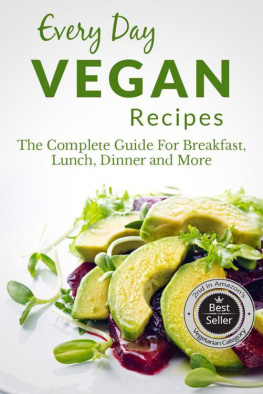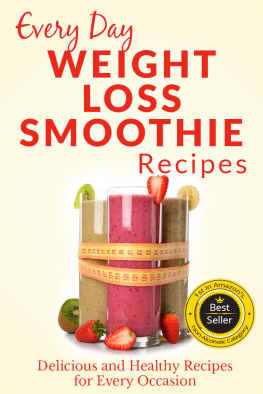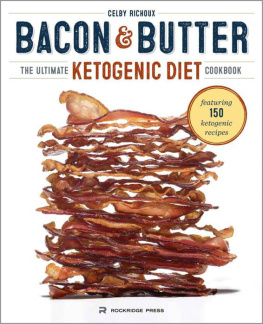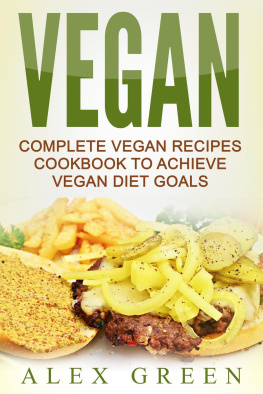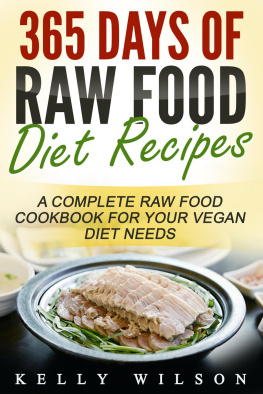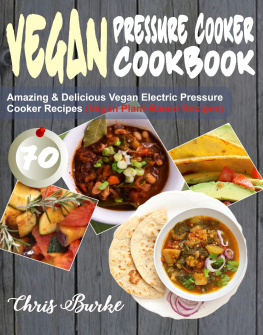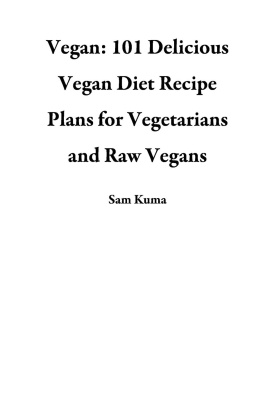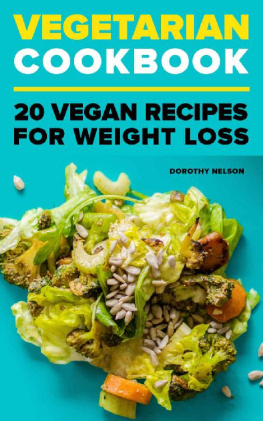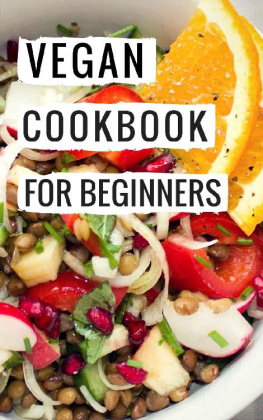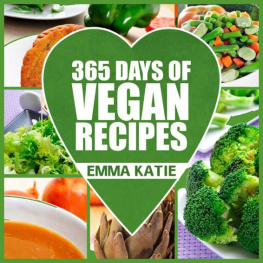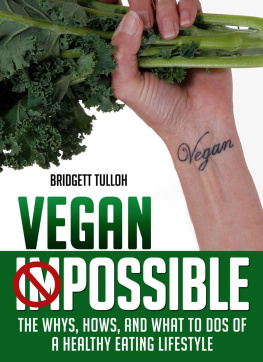How would you like to receive notice whenever a brand new eBook is available to download for free? All you have to do is click one link and Culinary Canary will be there to swoop in and drop off a notice for the newest eBook full of recipes to keep you excited about what you eat. Click here and well let you know exactly when your newest eBook is ready for you to take advantage of, with no spam or unnecessary emails clogging your inbox.
Introduction
If you say the word vegan in a crowd, reactions may be mixed. Some may wonder why youre speaking to yourself. Others may scoff at the vegan lifestyle while others will support you for a tough choice. For whatever reason you are or are going vegan, whether its health or animal rights, its good to know exactly what a vegan diet is and what a vegan diet does to your body.
A vegan diet is the same as a vegetarian diet, but also restricts any animal byproducts such as dairy, animal fat, eggs, and more. Some people extend this philosophy of using animals to all aspects of their lives which means they will not use products that are tested on animals or buy products that use animal parts (such as glue).
If youre a dietary vegan and a lifestyle vegan there are different things to watch out for. As a dietary vegan , you have to watch out for the obvious meats (beef, lamb, pork, chicken, duck, etc.), seafood (fish, oysters, crab, lobster, etc.), eggs of any kind, and dairy (milk, yogurt, cheese, butter, etc.). Besides these obvious items to avoid, theres also many other food items to avoid eating or using in cooking that would break a vegan diet such as honey, animal fat (i.e. lard), and anything else that comes from an animal.
As an ethical vegan , all of the same rules as a dietary vegan still apply but theres also rules surrounding the use of animal products in your daily life. Beeswax, Silk, fur, wool, leather, anything to do with the bones of animals, gelatin, whey, and any products that come from animals are not allowed to be used in your daily life. As a quick aside, veganism was derived from vegetarianism. Vegetarians follow many of the same rules as vegans but are allowed to eat and drink dairy products. As far as this book goes, if youre vegetarian but not vegan, feel free to replace certain ingredients with their dairy counterparts.
History
As stated, veganism does originate from vegetarianism.
Vegetarianism can be found in ancient civilizations around the world, but India and Greece may be most famous for it. To this day, India still claims to have over 500 million vegetarians. Although vegetarianism is Greece wasnt as prevalent, certain religious sects espoused the benefits of eating on a vegetarian diet. The reason these ancient societies voluntarily gave up meat was because of ethical or religious reasons, claiming to not eat other beings with souls. There has always been an undercurrent of veganism running through vegetarianism, with some vegetarians always refusing to use animals for choices besides just food. The vegan movement officially started to take root in the early 20 th century, with many vegetarians among the Vegetarian Society lamenting the use of dairy and eggs with the amount of animal cruelty used to produce these goods.
It was in the 1940s when the Vegan Society was established by Donald Watson and Elsie Shrigley on a moral basis. Since then, veganism has been taken up by doctors, scientists, athletes, and business people all over the world (including former president Bill Clinton, former heavyweight champion Mike Tyson, and Olympic gold medalist Carl Lewis).
Health Benefits
When it comes to going vegan, many people choose the lifestyle due to moral inclinations but there are also many health benefits that one who goes on the vegan diet gains. . One who goes on the vegan diet gains several benefits which translate to an increase in your fiber content, an increase in your sodium to potassium ratio, an increase in your vitamin content which results in a lower saturated fat amount, lower blood pressure, lower risk for heart disease, and lower cholesterol. There are definitely concerns with going vegan that need to be addressed, but if the dietary concerns are taken care of, theres no reason not to go vegan!
Fiber content
There are many benefits of regulating fiber in a diet.
If youre in the washroom reading this, then you may be experiencing one at this very moment. Some other, more conversationally appropriate benefits include reduced appetite, more regulated blood glucose levels, and improved cardiovascular health. These benefits lead to reduced risks of obesity, diabetes and cardiovascular diseases. We all know that we should get more fiber in our diets, but getting a good amount of fiber usually equates to eating bark cereal, or at least thats what most think. Eating green vegetables can significantly help increase you fiber content, and with a vegan diet, theres no doubt that youll be eating tons of green vegetables if you plan on varying your diet at all.
Sodium to Potassium Ratio
By studying the levels of these two elements inside the body, scientists have come to a conclusion that has major consequences on an individuals health.
It is the actually the ratio of sodium to potassium and not the absolute values of each element that is important. Potassium actually helps reduce the risk of cardiovascular diseases while excessive amounts of sodium increase the risk of those same diseases. The most effective way to keep these two elements in a good balance is to eat lots of fruits and vegetables. Since youll be eating a lot of fruits and vegetables on the vegan diet, youll be great at keeping this ratio high on the potassium end which can help you reduce the risk of heart attacks, strokes, high blood pressure, and other cardiovascular diseases.
Protein Content
Since protein serves as a type of building block for the body, which needs protein for countless tasks, it is important we get our protein from good sources. Although protein can be found in meat, red meat tends to be higher in fat and sodium.

